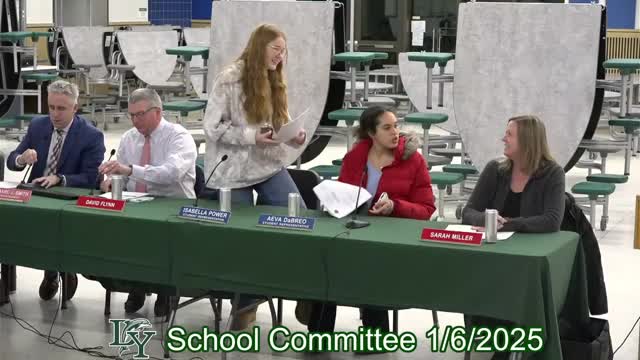Dennis‑Yarmouth committee hears $80.65 million preliminary FY2026 budget; proposes 4.89% increase
Get AI-powered insights, summaries, and transcripts
Subscribe
Summary
Superintendent Smith and finance staff presented an initial FY2026 operating budget of $80,647,452 — a proposed 4.89% increase — highlighting enrollment growth, rising out‑of‑district special‑education costs and new priorities including an English‑Learner director and in‑district special‑education programming.
Dennis‑Yarmouth Regional School District leaders presented an initial FY2026 operating budget of $80,647,452 and a recommended 4.89% increase at the school committee meeting on Jan. 6, 2025. The presentation laid out priorities tied to the district’s recently adopted strategic plan and set a timeline for a tentative committee budget vote next week.
The budget presentation, led by Superintendent Smith and district finance staff David (district staff), emphasized that roughly 72% of district operating costs are salaries and benefits. "We don't manufacture anything; we employ people to teach our children," David said, summarizing why personnel costs dominate the budget.
School leaders said the proposed operating budget includes a set of prioritized “adds” and a rubric to rank requests. The highest priorities (ranked 4) that were included in the recommended budget are: establishing a recurring supply line for the high‑school robotics program; funding for winter guard and winter percussion tied to an existing MOU; and a placeholder for a possible additional third‑grade teacher at a district elementary (held in the budget due to current second‑grade enrollment levels). Priorities ranked 3 include the addition of a district English‑Learner (EL) director and first steps toward an in‑district program to reduce out‑of‑district special‑education placements.
District officials stressed several drivers behind the budget. Enrollment has increased by about 100 students compared with last year, reversing a prior multi‑year decline. The district has seen a steady rise in students whose first language is not English — approaching roughly one in three students by the district’s internal count — and an increase in English learners. Out‑of‑district special‑education placements and the associated tuition and transportation costs have grown sharply; the presentation cited a statewide 14% increase in out‑of‑district tuition between FY23 and FY24 and showed both tuition and transportation costs for placements rising exponentially in recent years.
David walked the committee through the revenue side that remains uncertain: state Chapter 70 aid, school choice and charter school revenue/assessments, and the state’s proposed budget due Jan. 22. District staff said they expect to receive the governor’s proposed figures by Jan. 23 and will update assessments and the town contributions once state numbers are available. Debt service for next year was listed at $490,647; staff noted the high‑school bond payment will be the final payment in FY26.
Committee members asked for clarifications on multiple items. Member Nel asked whether the robotics, winter guard and winter percussion entries were cuts or added line items; district staff confirmed these are added recurring supply or MOU‑driven costs, not eliminations. Member Landers pressed about the third‑grade teacher placeholder, and staff explained the projection is driven by current second‑grade class sizes plus expected incoming kindergarten enrollment across the K–3 cohort. Member Morris asked about recruitment and housing pressures affecting staffing; Superintendent Smith and staff said housing and regional recruitment challenges are an ongoing constraint for Cape districts.
Next steps and timeline: staff will incorporate state revenue figures when released the fourth Wednesday in January, evaluate known retirement notices to estimate potential hiring savings, and return with refined figures. The committee must take a tentative budget vote next week to meet regional agreement timelines, followed by a budget hearing in February and a final adoption by the first meeting in March. Superintendent Smith said staff will return with recommended adjustments and any additional information the committee requests.
Clarifying details recorded during the presentation included: an operating budget total of $80,647,452 (4.89% increase), debt service of $490,647, a salary/benefits share of 72% of the operating budget, roughly $10 million in net state aid after assessments as an estimate discussed in the presentation, a net staffing reduction of 35.5 positions in the prior year and about 100 more students this year compared with the prior year. District staff noted the timing constraint that state budget figures needed for final assessments will arrive after the committee’s tentative vote deadline.
The committee did not take a final vote on the budget at the Jan. 6 meeting; members were asked to review priorities and return questions. District staff recommended the committee finalize priorities so staff can model the revised numbers once state aid figures and anticipated retirements are included.
